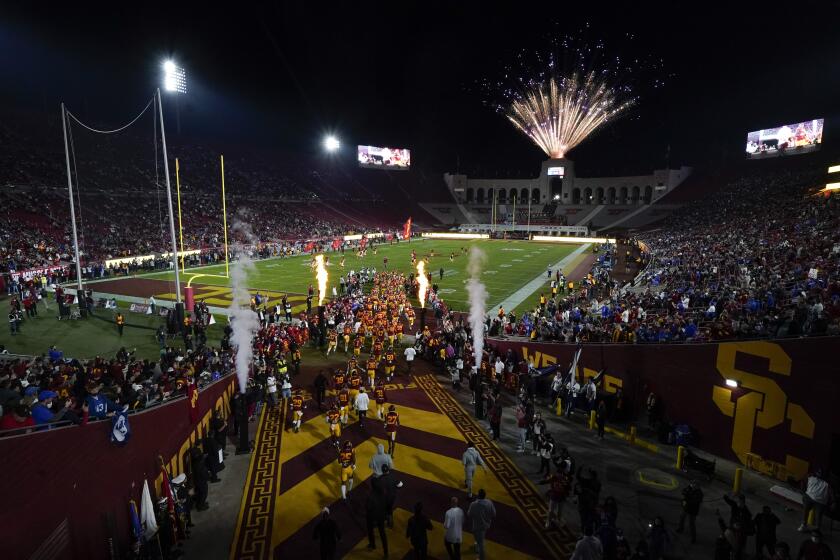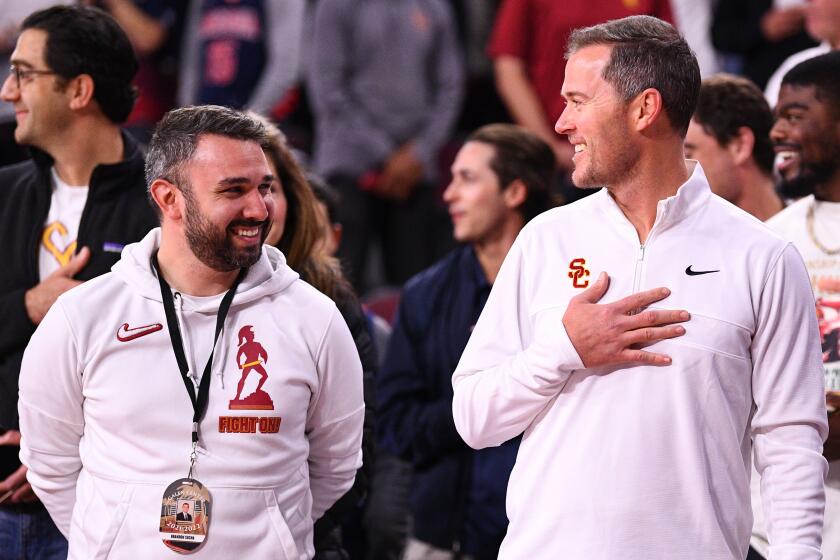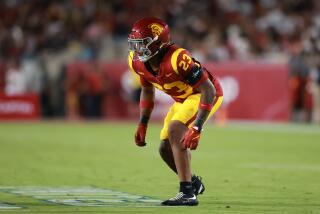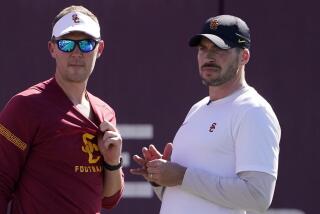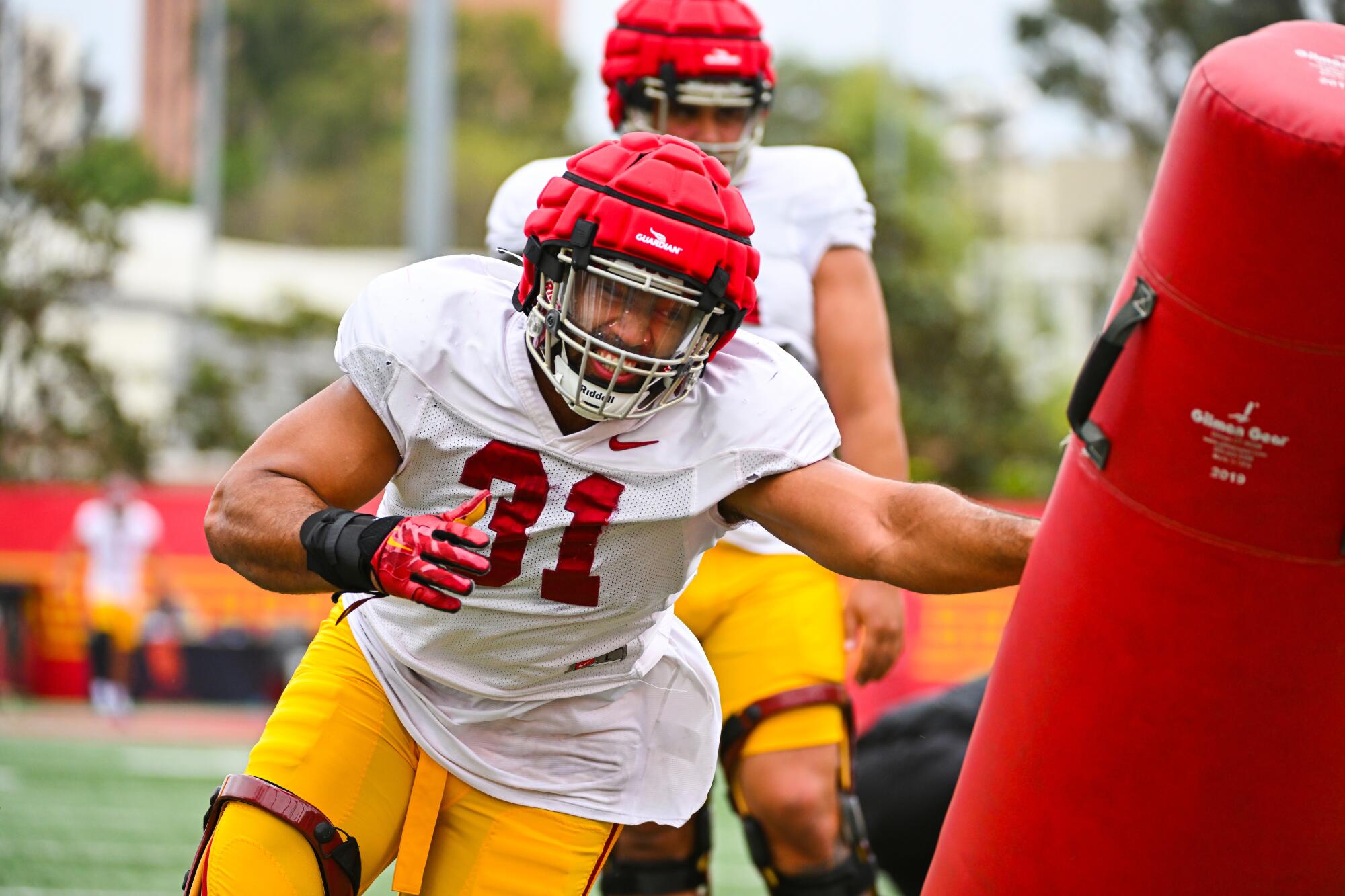
- Share via
Until his cousin, Bernard Afutiti, visited from the mainland nearly five years ago, the notion of playing college football had never occurred to Tyrone Taleni. And why would it? Taleni didn’t know football. He’d neither played nor spent any time watching the sport. Sure, football might be ingrained into the cultural fabric of nearby American Samoa, but on his home island of Savai’i, the western-most island in independent Samoa, rugby was still king.
When it came to rugby, Taleni was a natural. In his small mountain village of Vaiola, they played most days when school was out and the chores were done, sending punt after punt soaring over unspoiled paradise. Over the years, his family had carved out their own slice of this island oasis, living off the land, tending to chicken and cattle and pigs on a family homestead, where cacao, taro, bananas and mangoes grew plentifully.
His connection to the village ran deep, but after spending two years on a mission in Arkansas, Taleni returned to Vaiola in 2017 uncertain of his next steps. That’s when Afutiti and his wife, Crystal, came to the island for a visit.
USC announced a partnership with media company Stay Doubted that establishes a third-party agency to represent athletes and help facilitate NIL deals on their behalf.
It was Afutiti, a former college football player, who first floated the idea, planting a seed that would send Taleni careening down an unlikely path in an unfamiliar sport. Afutiti figured his cousin’s rugby talent might translate. Never in his wildest dreams did he believe that conversation would, years later, lead Taleni to USC.
He knew Taleni had designs on becoming a doctor, to help bring better medical access to Samoa. But pursuing that plan meant leaving the island for a higher education in the States, and college was costly. “He didn’t want to put any more burdens on his parents,” Afutiti says.
So Afutiti suggested football: “I told him it was probably his best way to earn a free education,” he said.
Taleni told his cousins he would pray on it.
A few weeks later, Taleni boarded a plane to California. He hasn’t been back to Samoa since.
“I was all-in,” Taleni said. “I didn’t know much about football at the time or how the education system works out here, or anything like that, but just the idea of him saying, ‘Come out here and try school, try football, you never know what might happen,’ I was very excited. … I guess, you could say it was a big leap of faith, leaving everything and not knowing what could happen.”
Brandon Sosna, who joined USC in 2019 and played a leading role in helping bring Lincoln Riley to L.A., is joining the front office of the Detroit Lions.
A few more leaps of faith would be required before Taleni found himself sitting across from Lincoln Riley in his office last January, including a big one from USC’s coach. Taleni was not exactly a proven commodity. He played fewer than 100 snaps of Power Five football over two years at Kansas State, where Riley first saw him when he was Oklahoma’s coach. Something in his film had given Riley faith.
“When you started to research him, the worker, his journey in football, it kind of made sense. The snaps he did play, we saw some things that we thought were intriguing,” Riley said. “But the more we found out about him, we were confident in the kind of kid we were bringing in here.”
Sitting with the coach and her cousin in Riley’s office, cousin Tutasi Asuega-Matavao could barely contain herself. She asked the coach if she could snap a selfie to commemorate the occasion, much to Taleni’s chagrin.
Their whole family had grown up as avid USC fans. Now Taleni was a Trojan? Seriously?
“It still blows our mind,” Asuega-Matavao said. “Like, how is this kid doing this?”
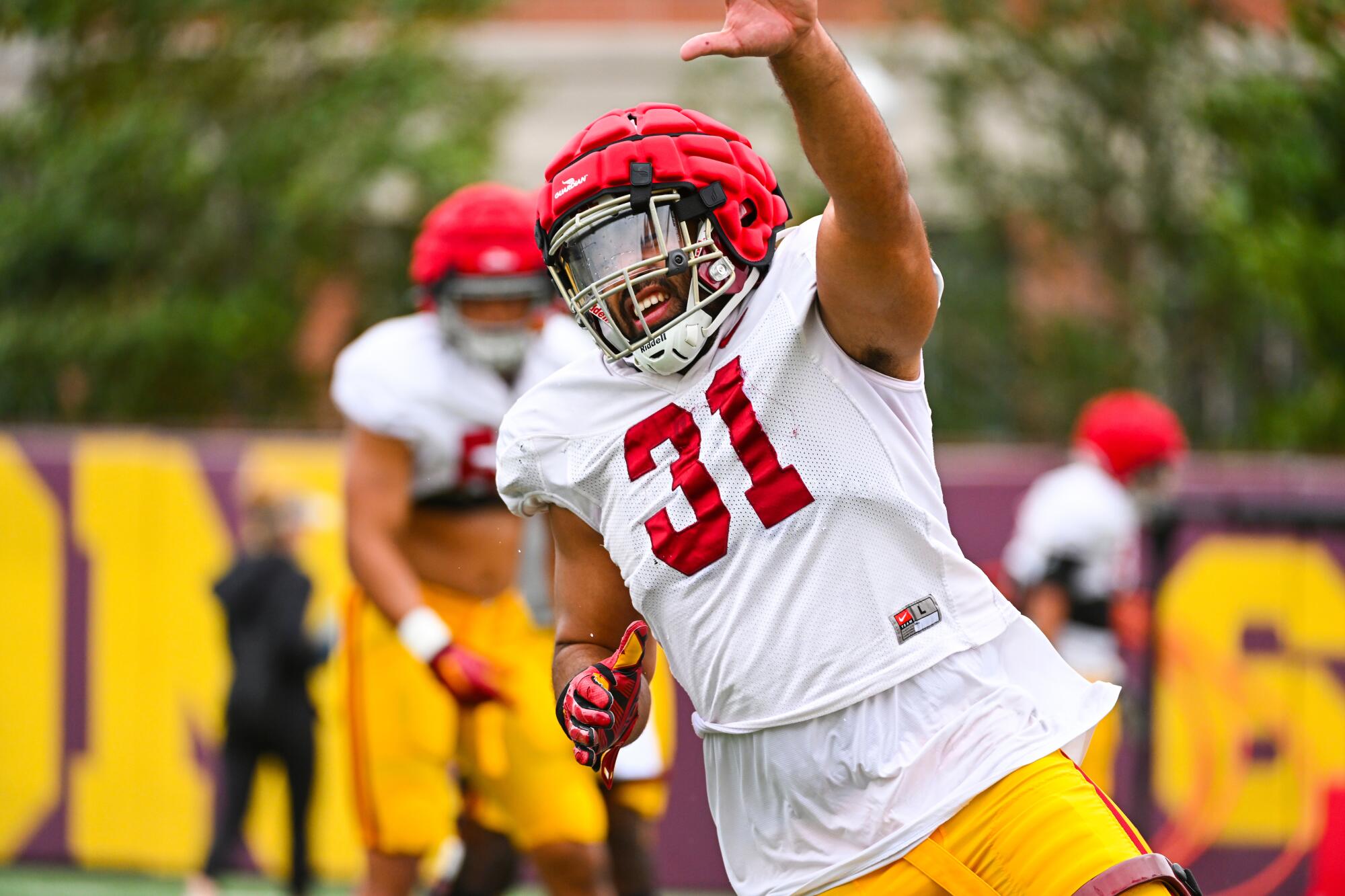
That improbable story begins at Mt. San Antonio College, a community college 25 miles east of downtown L.A. in Walnut, where Taleni showed up one day, approached the coach and asked for a shot. He figured, why not?
Bob Jastrab obliged. The team needed bodies, and in his nearly two decades as coach, he’d seen a few longshots like Taleni thrive.
“It’s on their own dime,” the Mt. San Antonio coach said, “So we give everyone an opportunity. Every once in while, there’s a guy where it’s like, ‘Where have you been all of my life?’ ”
But that wasn’t Taleni — at least, not at first. His athleticism was apparent, but he struggled initially to get comfortable in his uniform. He didn’t like the shoulder pads, the cleats, the mouthguard. The helmet felt awkward. He ripped out as much of the leg padding as possible.
It took time to get acclimated. At home, everything was different. On the football field, everything was new. He grayshirted that first season at Mt. SAC as he learned the finer points of playing on the defensive line, a position he took on purely because coaches put him there. Though Jastrab nearly changed his position after watching Taleni punt at practice.
“We were stunned. Like holy cow, a Power Five school recruiting you after one year?”
— Ula Matavao, on his cousin’s meteoric rise
“He could really rocket it,” Jastrab said. “It was like, ‘What are you doing playing the line? You can play on Sundays as a punter.’ But that didn’t last long.”
Soon enough, Taleni would settle in along the defensive front. By the end of his first full season at Mt. SAC, his potential was quickly becoming clear. Offers came in from schools such as Western Illinois, Robert Morris and Texas El Paso. Then came the offer from Kansas State.
“I asked my cousin when they called, what do you think of Kansas State?” Taleni recalled. “I had no idea.”
“We were stunned,” said Ula Matavao, another of his cousins. “Like holy cow, a Power Five school recruiting you after one year?”
Taleni committed that February. A few months later, he moved 1,500 miles east to Manhattan, Kan.
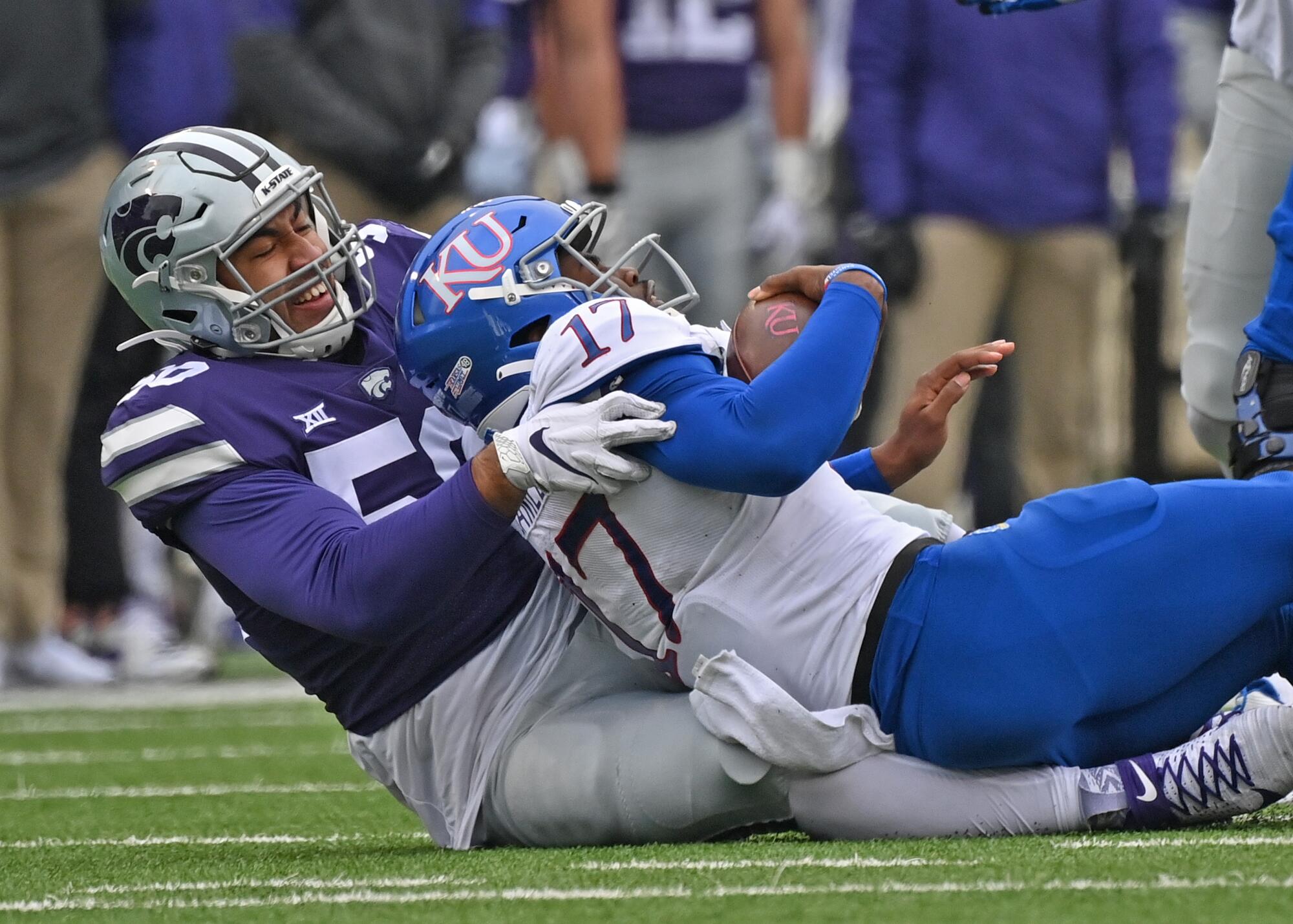
This time, the distance would wear on him. The pandemic made the transition even tougher. “It was a really long year,” Taleni remembers.
The bitter cold of a Kansas winter was yet another adjustment, made worse when the bike he’d bought to ride around campus was stolen.
“Still,” Asuega-Matavao said, “he never once complained.”
He brought a similar attitude to football, and the work started to pay off. He appeared in three games during the 2020 season, then seven in 2021. The progress was palpable, but the distance was still weighing heavy when he returned to California after that season. A visit from his sister, whom he hadn’t seen in several years, further solidified those feelings.
Taleni contracted COVID-19 just before he was scheduled to fly to Texas for Kansas State’s bowl game, and in the moment it felt like a sign. He chose to enter the NCAA transfer portal, setting his sights on a destination closer to California.
Yet there were no guarantees in the portal. His experience was minimal, his production limited. He’d notched just five tackles and two sacks over two seasons. The portal was filled with similarly unproven prospects looking for a new home.
“I knew there was a chance of not getting picked up,” Taleni said.
“It was another huge leap of faith,” Afutiti added.
But again, his faith would be rewarded.
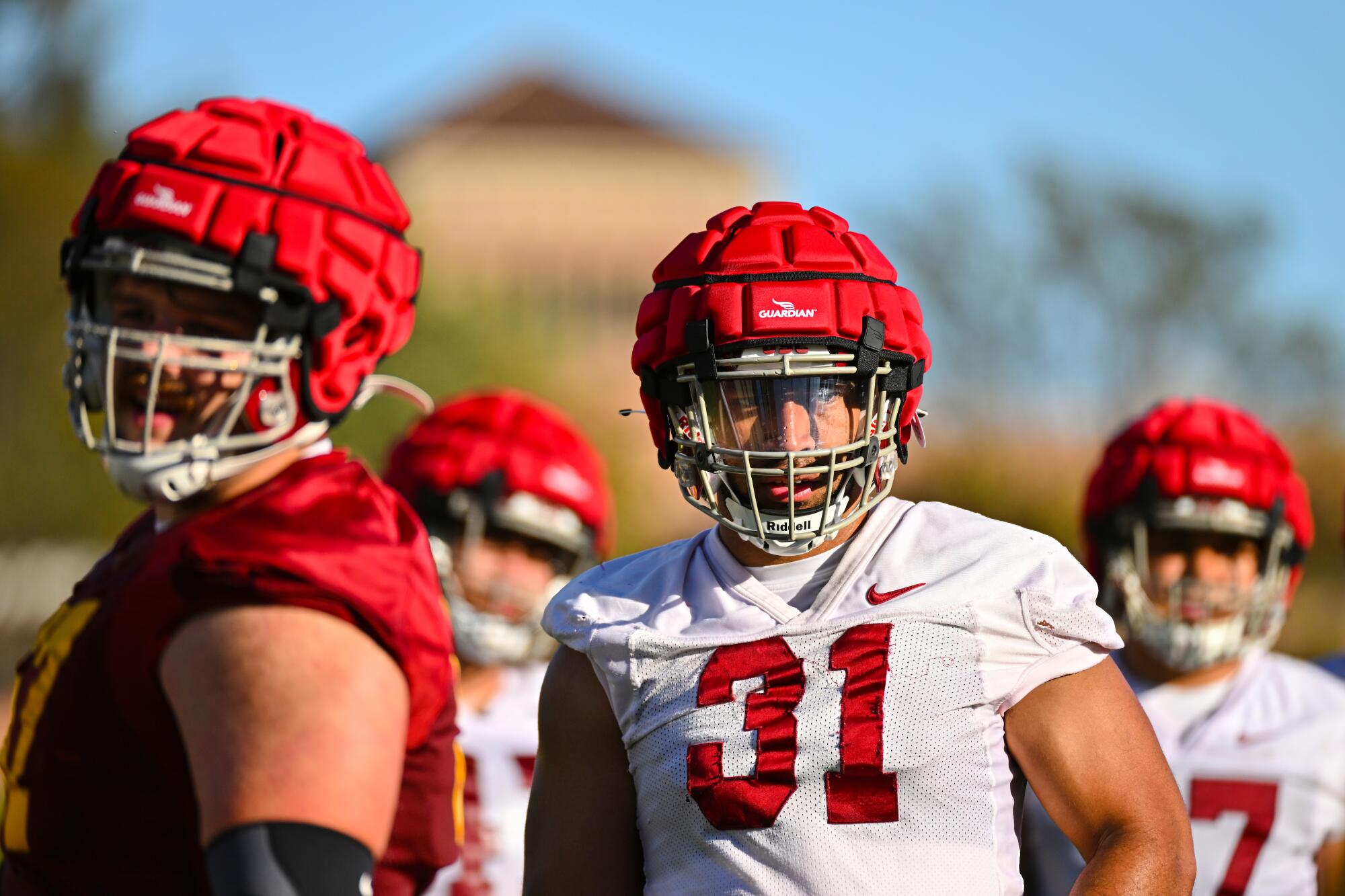
The call came almost immediately.
Not many could comprehend Taleni’s journey quite like Shaun Nua, USC’s new defensive line coach. He’d left American Samoa to live with family in Arizona, where his college career began at a junior college. He grew into an all-conference player at Brigham Young and a Super Bowl winner with the Pittsburgh Steelers, and as an assistant college coach in the years after, Nua became a staple of the Samoan football community. So much so that Taleni’s family knew exactly who he was upon hearing he reached out.
Nua and the rest of USC’s staff would go above and beyond to make Taleni feel at home, his family said. When he visited the campus, USC laid out a smorgasbord of familiar food — piles of rice with teriyaki beef and chicken, kalbi beef alongside creamy macaroni salad.
Sitting down with Riley, the coach recalled Taleni’s performance as a reserve defensive lineman in a game against Oklahoma two years earlier.
“Let’s be on the same side now,” Riley told him.
His family warned Taleni not to make the coach wait. So they set up a call for Nua to speak with Taleni and his parents over Facebook Messenger. Chickens from the family farm squawked in the background as Nua spoke to Taleni’s parents in their native language.
Michael Norman is trying to shake off a disappointing Tokyo Olympics and disrupted training because of the pandemic and injuries ahead of summer meets.
“Having someone who knows my mother tongue, who knows where I came from, having him talk to my family, it was a very special moment, one I’ll always remember my whole life,” Taleni said.
Nua had no idea Taleni planned to commit during the call. For Taleni, it was a perfect chance to finally bring his parents into his budding football career.
They’ve still never seen him play the sport he picked up almost four years earlier. Pandemic travel restrictions have remained in place for the island, making traveling to and from Samoa at any point over the past two years impossible.
“It’s my dream to bring them out here,” Taleni said.
He and his family have faith it won’t be long before that day arrives. And faith has certainly served Taleni well.
“That’s the day all of us are waiting for,” Asuega-Matavao said. “The borders will open, and we’re going to throw the biggest party USC has ever seen.”
More to Read
Go beyond the scoreboard
Get the latest on L.A.'s teams in the daily Sports Report newsletter.
You may occasionally receive promotional content from the Los Angeles Times.

